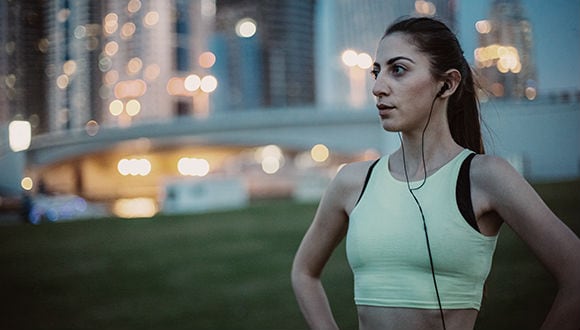How to exercise safely in the heat
Exercising outdoors is a great feeling, but physical activity in summer can have its downside. We find out how to work out safely during the warmer months.
Charmaine Yabsley
December 2017
There's a reason you might be more motivated to exercise when winter is over: you can get a more efficient workout when it's warm.
“The warmer your body, the more prepared it is for activity,” says exercise physiologist Carly Ryan from Exercise & Sports Science Australia. “The heat improves how your muscles move, so you don't need to warm up as much or for as long.”
One study at the University of Oregon found that athletes who trained in hot weather were much better prepared and fitter when it came to winter competition. But what do the rest of us need to be aware of when exercising outdoors during Australia's hot summer days?

Exercising in warm temperatures
If you've exercised in hot weather, you know how quickly you begin to sweat – which is a typical response to heat.
“Our bodies are very quick at cooling down when they get hot,” says exercise physiologist Naomi Ferstera. “The fitter we are, the better our bodies are at circulatory cooling. This is when our blood heats up and is shunted towards our skin where it’s cooled through sweating and the lower air temperature. It then moves around the body again before warming up and repeating the process.”
Listen to your body
“Your body will send you signals if it's struggling in the heat,” says Ryan. “Listen to it, continue with your exercise routine and adjust your workout if necessary.”
If you feel light-headed, get a cramp or a headache, Ryan recommends slowing down then and stopping. “If you stop sweating, that's a sign you need to stop exercising and seek medical advice as this may be an indication of heat stroke.”
Consider the best time to exercise
The best time is whenever works for you, but you may need to adjust your workout when it's hot.
“It's not just the temperature, it's also about your fitness level,” says Ryan. “Humidity, hydration and whether you're exercising in the shade can affect your workout.
“Ideally, do your exercise first thing in the morning or in the early evening, when it's cooler. If you’re exercising in the middle of the day [between 11am and 3pm], either head to the pool or indoors to an air-conditioned room.”
It's tempting to wear fewer clothes when you're exercising outdoors in the heat, but this increases your skin cancer risk. Fortunately, technology means that sports gear can now help your body regulate its temperature. “Wear clothes that breathe and wick moisture away,” says Ryan.
Be sun smart
Heather Walker, chair of Cancer Council Australia’s Skin Cancer Committee, recommends wearing a water-resistant sunscreen of at least SPF30, a hat and sunglasses, and if you must exercise outside during the middle of the day, find some shade.
Drink water
When you exercise in the sun, even if it's slow or moderate, your body will lose water. Which is why it's important to drink water regularly throughout the day, and especially before exercising.
“The general recommendation is 2-3 litres a day, but you should increase this in hot weather,” says Ryan. “If you feel thirsty, you're already dehydrated,” she says. “Try to start your exercise already hydrated and take a sip every 15 to 30 minutes. Drinking too much water during your workout can lead to nausea.”
Choose the right activity
If it's too hot to run or do other strenuous activities, what else could you try? “If you don't want to forgo your high-intensity workout, train indoors where there are fans and air-conditioning,” says Ryan.
“Or go for low-impact or low-intensity [fitness]. There's a misconception that you need to flog your body whenever you train, but there are lots of benefits to low-intensity training. Try yoga, Pilates, stretching or walking. Try to avoid anything where you're generating a lot of heat or losing a lot of sweat, and be a little more gentle on your body."
Related articles
WHAT KIND OF EXERCISER ARE YOU?
From people player to weekend warrior, find the key to enjoying your workouts and sticking at them.
EXERCISE FOR HEALTHY BONES
Bone health is a key factor in ageing well and exercise can help you build stronger, denser bones.
IS RUNNING GOOD FOR YOU?
Depending on who you ask, running will either add years to your life or age you prematurely. Here are the facts.